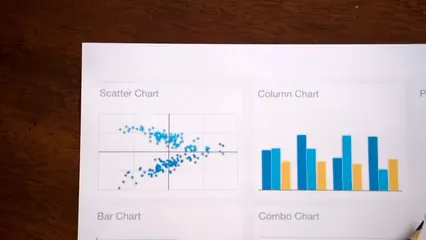Introduction
In a world where data reigns supreme, the role of a data analyst has never been more crucial. Think of yourself as a data detective, unraveling complex patterns and providing vital insights that drive business decisions. If you have a knack for numbers and a passion for problem-solving, entry-level data analyst jobs might just be your golden ticket to a rewarding career.
Imagine waking up every day knowing your work influences key decisions in a company. You’ll be diving into data, making sense of what it all means, and helping organizations thrive. It’s not just about crunching numbers; it’s about storytelling through data. You’ll uncover trends, visualize results, and present your findings in ways that even your grandma could understand—no PhD required!
This blog post will explore everything you need to know to kickstart your journey in this dynamic field—from job descriptions and essential skills to salary expectations and job-hunting tips. We’re talking about the full package! You’ll learn how to shine in interviews, what tools to master, and how to build a portfolio that wows potential employers.
So, grab your magnifying glass (or maybe just your laptop), and let’s embark on this exciting career path together! Whether you’re a recent grad or looking to switch careers, the world of data analytics is calling your name. With the demand for data analysts skyrocketing, there’s never been a better time to get involved. Are you ready to answer the call? Let’s uncover the secrets of data analytics and see how you can make your mark in this thrilling field!

Summary Section
This article provides a thorough overview of entry-level data analyst jobs, emphasizing the burgeoning demand for these roles across various industries. Key points include:
- Job Responsibilities: Learn what day-to-day tasks an entry-level data analyst typically undertakes, such as data collection, cleaning, analysis, and visualization. You’ll become a master of using tools like Excel and SQL to make sense of what the numbers are telling you. For a comprehensive guide, check out Excel 2019 for Dummies.
- Essential Skills: Discover the technical and soft skills needed to succeed, including proficiency in programming languages like Python and SQL, as well as strong analytical and communication abilities. Your ability to convey complex findings in a digestible manner will set you apart. If you want to dive deeper into Python, consider Python Crash Course, 2nd Edition.
- Job Market Overview: Get insights into the current job market landscape for data analysts, highlighting industries that are actively hiring and the geographical hotspots for these positions. Companies are snapping up data talent in finance, healthcare, and e-commerce, among others.
- Salary Expectations: Understand the salary range for entry-level positions and how factors like location and industry can influence compensation. Entry-level salaries often range from €40,000 to €55,000 in Germany, with potential for rapid growth.
- Career Advancement: Explore potential career paths and opportunities for growth within the data analytics field, from junior analyst roles to senior positions and beyond. The sky’s the limit if you’re willing to learn and adapt!
- Job Search Strategies: Learn effective tips for finding and applying for entry-level data analyst jobs, including leveraging online platforms and networking opportunities. Building a network in the industry can significantly enhance your chances of landing that dream job.
Curious about how to navigate this exciting career path? Keep reading for a detailed breakdown of everything you need to know!

What is an Entry-Level Data Analyst?
Definition and Overview
An entry-level data analyst is the rookie in the data analytics world, often tasked with turning raw data into actionable insights. Think of them as the starting players on a data-driven team. They gather, process, and analyze data to help businesses make informed decisions.
This role is vital in today’s data-centric landscape. Companies are drowning in numbers and need skilled individuals to sift through the chaos. Entry-level data analysts contribute significantly by providing clarity from data, ultimately guiding organizational strategies. They are the unsung heroes behind those impressive graphs and statistics you see in board meetings. Without them, decision-makers would be lost in a sea of figures, like a ship without a captain.

Key Responsibilities
So, what exactly does an entry-level data analyst do? Their day-to-day tasks can vary, but typically include:
- Data Collection: They gather data from various sources, such as databases, spreadsheets, and online platforms. It’s like being a treasure hunter, but instead of gold, they’re seeking valuable insights!
- Data Cleaning: This involves scrubbing the data to remove errors and inconsistencies. Think of it as tidying up your room before guests arrive. A clean dataset is crucial for accurate analysis.
- Data Analysis: Analysts use statistical methods to interpret data. They look for trends and patterns that can inform business strategies. It’s like solving a mystery, piecing together clues to reveal the bigger picture.
- Data Visualization: Crafting charts and graphs to present their findings is part of the gig. A well-designed visualization can tell a compelling story and make complex data digestible for everyone. If you’re interested in learning more about this, grab a copy of Tableau 2021 for Beginners: A Practical Guide.
- Reporting: They create reports summarizing their findings, often preparing presentations for stakeholders. Imagine being the storyteller at a campfire, captivating your audience with data-driven tales!
- Collaboration: Entry-level analysts frequently work with cross-functional teams. They connect with marketing, finance, and IT departments to ensure data-driven decisions are well-informed. Teamwork makes the dream work, after all!
In summary, entry-level data analysts wear many hats. They are data collectors, cleaners, analyzers, visualizers, reporters, and collaborators. Their contributions help organizations navigate the data maze and drive strategic decisions.

Required Skills for Entry-Level Data Analyst Jobs
Technical Skills
To thrive as an entry-level data analyst, certain technical skills are essential:
- Data Analysis Tools: Proficiency in tools like Excel and SQL is a must. Excel is the Swiss Army knife of data analysis, while SQL helps in querying databases. Knowing Python or R can also be beneficial, as they are widely used for statistical analysis. For more on the tools you should master, check out this article on data analysis tools for shelter statistics in social services. If you’re interested in SQL, consider checking out SQL for Data Analytics: A Beginner’s Guide.
- Data Visualization: Familiarity with visualization tools such as Tableau or Power BI is crucial. These tools help transform raw data into visually appealing charts and graphs. A picture is worth a thousand words, and in data, it can be worth a thousand insights!

Soft Skills
While technical skills are important, soft skills can set candidates apart:
- Analytical Thinking: Analysts must interpret complex data sets and identify trends. This requires a sharp analytical mind, able to connect the dots between numbers.
- Communication Skills: Being able to explain findings to non-technical stakeholders is vital. Data analysts often play the role of translator, turning complex analyses into understandable insights.

Certifications and Education
Educational background and certifications can enhance employability:
- Relevant Degrees: A bachelor’s degree in Mathematics, Statistics, Computer Science, or a related field is usually required. These degrees provide a solid foundation for analytical thinking and technical skills.
- Certifications: Earning certifications, such as the Certified Analytics Professional (CAP) or Google Data Analytics Professional Certificate, can boost your resume. It shows commitment to the field and enhances your knowledge base.
With the right blend of technical expertise, soft skills, and educational qualifications, entry-level data analysts can carve a niche for themselves in the bustling data landscape. They are the future of data-driven decision-making, ready to take on challenges and uncover insights that propel organizations forward.

Job Market for Data Analysts
Current Landscape
The demand for data analysts is booming across several industries. Companies in finance, healthcare, and e-commerce are leading the charge. In finance, analysts help organizations understand market trends and consumer behavior. They provide insights that drive investment strategies and risk management. In healthcare, data analysts sift through patient data to enhance care quality and operational efficiency. They analyze treatment outcomes to help hospitals make informed decisions. For e-commerce businesses, understanding customer preferences is key. Data analysts play a pivotal role in personalizing shopping experiences and boosting sales.
Germany, in particular, is a hotspot for data analyst jobs. Major cities such as Berlin, Munich, and Frankfurt are at the forefront of this trend. Berlin, with its vibrant tech scene, is a magnet for startups and established companies alike. It boasts over 330 vacancies for data analysts. Munich isn’t far behind, offering around 240 positions, especially within finance and automotive sectors. Frankfurt, known as Germany’s financial hub, has approximately 207 job openings, catering to various industries seeking data expertise. Other cities like Hamburg and Cologne also contribute to this growing demand.
The trend doesn’t show signs of slowing down. As companies become increasingly data-driven, the need for skilled analysts is set to rise. This creates a wealth of opportunities for aspiring professionals looking to break into the field. To enhance your understanding and skills in data analysis, consider reading The Data Warehouse Toolkit: The Definitive Guide to Dimensional Modeling.

Salary Expectations
Now, let’s talk numbers—specifically, salary expectations for entry-level data analysts. In Germany, entry-level salaries typically range from €40,000 to €55,000 annually. However, this can vary based on location and industry. For instance, analysts in Berlin may earn between €45,000 and €65,000, reflecting the city’s high cost of living and competitive job market. In Munich, the range is slightly higher, with salaries reaching up to €70,000 due to the city’s strong finance and tech sectors.
But wait, there’s more! Aside from base salaries, many companies offer attractive perks. Think health insurance, generous vacation days, and retirement contributions. Some even provide funding for continued education and professional development. These benefits can significantly enhance overall compensation packages, making entry-level positions even more appealing.
In summary, the job market for data analysts is thriving, with ample opportunities across various industries and locations. Salaries are competitive and are accompanied by a range of benefits, making this an attractive career path for many. So, if you’re looking to jump into the data world, now is the perfect time to seize the opportunity!

Tips for Landing Your First Data Analyst Job
Job Search Strategies
Finding your first data analyst job doesn’t have to feel like searching for a needle in a haystack. Start by effectively utilizing job boards and networking platforms like LinkedIn. These platforms are treasure troves of job listings. Set up alerts for new openings and actively engage with industry professionals. Follow companies that interest you and join relevant groups to expand your network.
Don’t forget the importance of tailoring your resume and cover letter for each application. Highlight your skills and experiences that align with the specific job requirements. Use keywords from the job description to increase your chances of passing through automated filters. A personalized application can make you stand out in a sea of candidates.

Building Experience
Experience is king in the data analytics world. If you’re struggling to land a job, consider internships, volunteer work, or freelance projects. These opportunities can provide hands-on experience and enhance your resume. Even if the role isn’t strictly data analysis, any experience with data collection or reporting can be valuable. For more guidance, check out our comprehensive guide on statistics internships summer 2024.
Creating a portfolio is another fantastic way to showcase your analytical skills. Include projects or case studies that demonstrate your ability to analyze data, visualize findings, and make actionable recommendations. This portfolio can become your secret weapon during interviews, allowing potential employers to see your skills in action.
By employing these strategies, you’ll position yourself as a strong candidate in the competitive job market for data analysts. Remember, persistence is key! Keep honing your skills and expanding your network, and you’ll soon find that coveted entry-level position.

Career Advancement in Data Analytics
Growth Opportunities
As an entry-level data analyst, your career path can flourish in numerous directions. Many analysts choose to transition into data science roles, where advanced statistical methods and machine learning take center stage. With the right training, you can evolve from basic data handling to predictive modeling, making you a key player in shaping business strategies. To get started, consider picking up Data Science for Business: What You Need to Know About Data Mining and Data-Analytic Thinking.
Alternatively, you might find yourself gravitating towards management roles. As you gain experience, the ability to lead projects and mentor junior analysts becomes increasingly valuable. Transitioning to a managerial position allows you to influence team dynamics, drive projects, and contribute to high-level decisions.
Continuous learning is crucial in this field. New tools and technologies emerge frequently, making it essential to stay updated. Online courses, workshops, and certifications can help sharpen your skills, ensuring you remain competitive. Furthermore, the more skills you acquire, the more opportunities you’ll have to advance.
Networking should not be underestimated. Building relationships with professionals in your field can open doors to new positions and collaborations. Attend industry conferences, webinars, and local meetups to connect with like-minded individuals. The data analytics community is vibrant and welcoming, so don’t hesitate to engage!

Networking and Professional Development
Networking plays a pivotal role in career advancement. Attending industry conferences, workshops, and meetups can significantly enhance your professional presence. These events are goldmines for knowledge and connections. You’ll learn about the latest trends, tools, and practices while interacting with industry experts and fellow analysts.
Joining professional organizations or online communities can also provide long-term benefits. Organizations such as the International Institute of Business Analysis (IIBA) or local data science groups offer resources, training, and networking opportunities. Online platforms like LinkedIn and specialized forums can help you connect with others in the field, share insights, and even find job openings.
By engaging with your peers and learning from their experiences, you can gain valuable insights into navigating your career. Plus, staying active in the community keeps you informed about job openings and industry shifts.
In summary, the data analytics field is filled with potential for growth. By honing your skills, networking effectively, and embracing continuous learning, you’ll position yourself favorably for a successful career.

Conclusion
In conclusion, embarking on a career as an entry-level data analyst offers a plethora of opportunities in a rapidly evolving field. With the right skills, a proactive job search strategy, and a commitment to continuous learning, you can position yourself for success in this exciting profession.
The demand for data analysts is only expected to grow, making this an opportune time to jump in. Companies across various sectors are realizing the importance of data-driven decision-making. As organizations increasingly rely on data to guide their strategies, your role becomes vital.
Whether you’re just starting or looking to make a career transition, remember that the journey is just as important as the destination. Embrace every opportunity to learn and grow. Engage with your peers, seek mentorship, and never stop exploring new areas in data analytics.
Are you ready to take the plunge into the data-driven world? The adventure awaits! With determination and enthusiasm, you can craft a rewarding career that not only satisfies your curiosity but also contributes meaningfully to your organization’s success.

FAQs
What qualifications do I need to become an entry-level data analyst?
To kickstart your journey as a data analyst, obtaining a bachelor’s degree in fields like Mathematics, Statistics, or Computer Science is typically essential. Familiarity with analytical tools such as Excel, SQL, and programming languages like Python or R is also crucial. These qualifications pave the way for a successful entry into this exciting field.
Are data analyst jobs remote-friendly?
Absolutely! Many companies, particularly in the tech sector, are embracing remote and hybrid work models. This flexibility allows data analysts to work from the comfort of their homes while contributing to data-driven decisions across the globe. So, whether you prefer your PJs or business casual, you can balance work and comfort.
What industries are hiring entry-level data analysts?
Industries like finance, healthcare, e-commerce, and technology are on the lookout for talented data analysts. These sectors are increasingly reliant on data to guide their strategies. This means there are plenty of opportunities for you to jump right in and start making your mark!
How can I improve my chances of getting hired?
To boost your employability, consider gaining relevant experience through internships or volunteer work. Building a strong portfolio showcasing your analytical projects can also make you stand out. Don’t forget to continuously upskill through online courses or certifications. The more you learn, the more attractive you become to potential employers.
What is the career trajectory for data analysts?
Many entry-level analysts advance to senior analyst positions, data scientists, or analytics managers with experience and further education. As you gather skills and knowledge, your career can take off to exciting heights! The data analytics field is vast and full of potential for those willing to grow and adapt.
Please let us know what you think about our content by leaving a comment down below!
Thank you for reading till here 🙂
All images from Pexels




